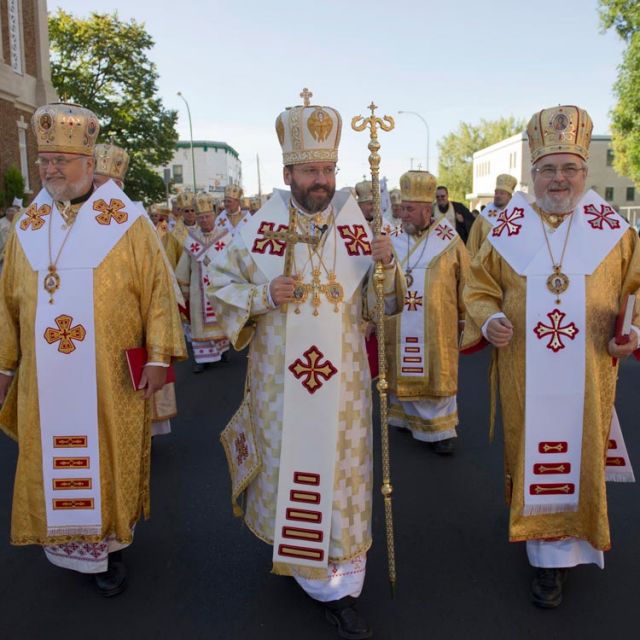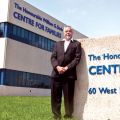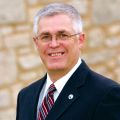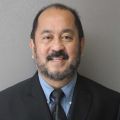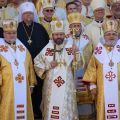WINNIPEG - Ukrainian Catholic bishops from four continents gathered for a final celebration Sept. 16 as they closed their weeklong Synod of Bishops.
One of their emphases was on the role of the laity, and the final "gala," as it was billed, included the Hoosli Ukrainian Male Chorus, an honour guard and the Selo Ukrainian Dancers.
Archbishop Sviatoslav Shevchuk of Kiev-Halych, the elected head of the Ukrainian Catholic Church, challenged his audience of 800 to live Christian life to the fullest and not as "lukewarm, nominal Christians."
"If we allow ourselves to be overcome so we don't pray or enter into liturgy, we will cease to be a Church," Shevchuk said. "We are called to be people of prayer, gasping for the air of the Holy Spirit.
"Sometimes our churches are more like Ukrainian museums. We need vibrant parishes, a place to encounter the living Christ. May our encounter today fill us with new faith, energy and perseverance."
Reinvigorating Ukrainian parishes is part of Vision 2020, the long-range pastoral plan for the Ukrainian Catholic Church, which was suppressed for decades under Soviet rule.
After an opening Divine Liturgy in Winnipeg Sept. 9, the 38 bishops in attendance moved to Portage La Prairie, a city of about 13,000 west of Winnipeg. Focusing on the theme "The Role of the Laity in the Life and Mission of the Church," they heard presentations and reports before breaking into smaller thematic groups.
A statement issued at the end of the synod said the bishops acknowledged the role of the laity in preserving the faith when the Church was suppressed in the 20th century, and they issued a pastoral letter to the laity; it was not immediately available in English.
"The laity must be collaborators with the bishops and priests in pastoral work and, with their giftedness and by their talents, contribute toward the building up of the body of Christ," the statement said.
The bishops proclaimed a patron of Ukrainian Catholic laity: Blessed Volodymyr Pryjma, a choir director from the parish of Stradch, Ukraine, who in 1941 was tortured and murdered by Soviet paramilitary agents in a forest after taking Communion to a sick woman with his priest.
They also pledged to support Ukrainians who have emigrated from their home country.
Bishop Borys Gudziak, newly named bishop for Ukrainian Catholics in France, Belgium, Netherlands, Luxembourg and Switzerland, told Catholic News Service before the synod began that in the last 18 years, Ukraine has lost up to 15 per cent of its population to emigration.
"People have been leaving in droves," he said, noting that, in many countries, the Ukrainians are illegal and living on the margins of society.
Gudziak was one of four bishops elected to the permanent synod for the next five years. Others were Archbishop Volodymyr Vijtyshyn Ivano-Frankivsk,
Ukraine; Bishop Ken Nowakowski of New Westminster, B.C.; and Bishop Jaroslav Pryriz of Sambir-Drohobych, Ukraine.
Next year's general Synod of Bishops will be Aug. 11-13 in Kiev, Ukraine, and will have as its theme the new evangelization.
Forgiveness can change the world as we know it
By Michael Swan, The Catholic RegisterTORONTO - Nobody disputes that forgiveness is the right thing to do, or that it might sometimes be difficult. Immaculée Ilibagiza has much more than that to say about forgiveness.
The Rwandan genocide survivor and best-selling author believes forgiveness can be the basis of our society — the foundation for a different kind of politics, a better sort of media, a more purposeful economy, higher ideals in education, stronger families and a new world order.
“It’s about understanding that forgiveness is peace. Peace starts in the heart. It starts in the family. It comes to the country,” Ilibagiza told The Catholic Register.
Ilibagiza will be at the Marylake Our Lady of Grace Shrine in King City, Ont., Sept. 28-29 to tell her story and nudge the audience into a deeper understanding of forgiveness.
Ilibagiza’s story of survival in the midst of the 1994 Rwandan genocide is as raw and inspiring as any. She and seven other women spent 91 days in silence hiding in a bathroom at the church rectory. She began those 91 days as a 52-kliogram (115-pound) 24-year-old surrounded by family everywhere she went. She emerged just 30 kilograms (65 pounds) as one of the last surviving Ilibagizas. Only one brother, who happened to be abroad during the orchestrated massacre of 900,000 Rwandan Tutsi and Hutus judged too friendly with Tutsi, survived.
In the cramped bathroom, Ilibagiza had a Bible, a dictionary and a rosary her father had given her. With the Bible and the dictionary she learned English. With the rosary she deepened her relationship with Mary.
Outside the church yard she confronted a man armed with a machete — the same man who killed her mother and a brother. She said to him, “I forgive you.”
In the aftermath of the genocide, Ilibagiza worked for the United Nations and eventually moved to New York to work at United Nations headquarters. She would quietly tell her story to co-workers and friends, but it wasn’t the sort of story that could stay quiet.
Eventually she wrote Left To Tell: Discovering God Amidst the Rwandan Holocaust. No ordinary venture into religious publishing, Left To Tell became a New York Times best seller, has been translated into 15 languages and has been added to the curriculum for thousands of high school and university students around the globe.
By now, Ilibagiza has told her story hundreds of times. DVDs of her retreat talks sell online and she’s signed a contract with MPower Pictures to transform her story into a feature film. But the 42-year-old mother of two continues to be surprised by the effect her story has on audiences.
“I’m really more amazed by what people take from my story,” she said. “What people take is that forgiveness, in such a magnificent way, is in their hearts.”
Ilibagiza has been confronted with many audience members who, either at the end of her talk or weeks later, discover a capacity to forgive husbands, wives, parents, children, brothers and sisters. But Ilibagiza also emphasizes how personal and intimate acts of forgiveness within families and among friends can begin a process that reaches beyond that immediate circle.
The touchstone of Ilibagiza’s talks is the spirituality of the rosary. She has written a book about the apparition of Our Lady of Kibeho, a recognized Marian apparition from the early 1980s in a small town in Rwanda. The apparition included a vision of men with machetes and a warning about the dire consequences of turning away from God.
The economic and social implications of reconciliation and forgiveness are on display to the world in Rwanda today, Ilibagiza said. The number of universities and university enrollment have skyrocketed since the genocide. The economy is growing at eight per cent yearly and Africa’s most densely populated and deeply divided nation is discovering a new sense of citizenship that transcends ethnic identity, she said.
“People are building now more than ever, because they learned a lesson,” said Ilibagiza. “My reason to forgive is that I finally came to understand that people can change, people can learn, people are smart.”
Ilibagiza has taken her gospel of forgiveness to the Vatican and an audience with Pope Benectict XVI. She met with the Pope at the end of his Angelus address Sept. 4. She found the experience overwhelming.
Tickets to Ilibagiza’s talk at Marylake are $50 for general admission or $100 for reserved seating, a reception with her and a signed copy of Left To Tell. Call (905) 833-5368 or visit www.luvn4gve.ca.
Bringing safety to troubled marriages
By Michael Swan, The Catholic RegisterBRAMPTON, ONT. - Catholic social workers in Brampton and Mississauga have found a new way to stand up for marriage by standing with as many allies as they can find.
Catholic Family Services Peel-Dufferin, a Catholic social work agency at the service of all families in the suburbs west of Toronto, is the lead agency for the Safe Centre of Peel, a family justice centre in the William G. Davis Centre for Families in Brampton.
“As Catholics, we can’t be afraid to lead,” said Mark Creedon, executive director of Peel-Dufferin Catholic Family Services.
Creedon has pulled together eight critical agencies that serve women and families faced with violence. Rather than being referred from one location to another to obtain housing, counselling, legal aid, medical advice, child care and more, at the Safe Centre it all happens in the same place. The idea is to deliver more effective and timely help and prevent women from giving up hope and returning to life with their abuser.
“Our purpose (at Catholic Family Services) is to preserve true marriages,” said Creedon. “If somebody goes into a marriage thinking his wife is his punching bag, well that’s not really a marriage.”
The Brampton Safe Centre isn’t the first Canadian family justice centre led by a Catholic agency. The former Catholic family services agency in Kitchener-Waterloo, now known as Mosaic, took the lead in establishing the Family Violence Project of Waterloo Region in 2006.
The idea of pooling and co-ordinating services to battered women in a single location started in San Diego, Calif., in 2002. Former City Attorney Casey Gwinn brought together police and social work agencies to form a united child abuse and domestic violence unit. To date, Gwinn’s National Family Justice Alliance has fostered and encouraged 80 family justice centres in the United States and 30 internationally from Amman, Jordan, to Sonora, Mexico.
“The fundamental issues are the same whether you’re in Canada, Mexico, Europe or anywhere else in the world,” Gwinn told The Catholic Register.
In the case of Canadian centres, having religious agencies lead the conglomerate of services is an advantage, he said.
“That spiritual care piece does make the Canadian model more vibrant. We struggle in the United States to get the spiritual care piece addressed in family justice centres,” he said.
Though it’s a Catholic agency that acts as landlord and instigator at the Safe Centre of Peel, the centre is able to connect clients with spiritual care for people of all faiths. The other agencies may not be Catholic, but they share values and a common purpose with Catholic Family Services, said Creedon.
“We’re dealing with excellent partner agencies that have great values which we share,” he said.
While Creedon has been able to get most of the critical services to buy in, he has struggled to get Peel Regional Police onside. The police are part of the Safe Centre’s steering committee and have worked out a protocol for getting victims from the Safe Centre to the police station. But they refuse to station officers already dedicated to domestic violence cases at the centre.
Peel Police claim their “best practice business model” involves working with the Safe Centre of Peel, but “does not involve the permanent stationing of officers within the facility,” Staff Sergeant Rob Higgs told The Catholic Register in an e-mail.
“It’s very shortsighted for law enforcement to say, ‘Oh, this isn’t really our thing,’ ” said Gwinn. “Law enforcement officers around the world are realizing they can’t do the job alone. They’re never going to arrest their way out of the problem.”
Peel Police responded to 2,042 criminal intimate relationship incidents in 2011 and another 6,554 verbal domestic occurrences. Overall, domestic calls in Peel have increased 13.99 per cent between 2008 and 2011, according to Higgs.
The more police come to the house and do no more than record the incident or negotiate temporary quiet, the more abusive men feel the law won’t touch them, said Gwinn.
“Empowered batterers are more likely to fight with police officers. Empowered batterers are more likely to kill police officers,” said Gwinn.
The repeat visits also cost taxpayers hundreds of thousands of dollars in police resources that don’t produce convictions, said Gwinn.
Creedon would like to persuade police to station officers at the Safe Centre, but for now hopes working effectively with police will convince the next chief to assign officers to the centre.
Getting this right is about much more than saving the police budget or getting more convictions. For Creedon, it’s about changing the direction for the next generation.
“One of the things we know about domestic violence is how much it is a generational thing,” he said. “So if you grow up in a family where your mother is getting abused — or it could be the father, but somebody is getting abused in that family — you are three times more likely to grow up to be an abuser or to be abused.”
Nationally the scale of the problem is immense. In 2007 there were more than 40,000 incidents of spousal violence reported to police, about 12 per cent of all police-reported violent crime in Canada, according to Statistics Canada. Women were the victims 83 per cent of the time.
“I totally believe there is something about being a Catholic family service agency that following the Catholic social justice values forces us to not walk away when we see tremendous injustice,” said Creedon.
Union support of political causes is under the gun
By Deborah Gyapong, Canadian Catholic NewsThe days may be numbered for union support of contentious political causes, something the Catholic Civil Rights League has been working towards for years.
While the league has been concerned about union support for same-sex marriage and other issues in opposition to Catholic teaching, the tipping point for political change may be the Public Service Alliance of Canada’s (PSAC) recent support for separatist candidates in the Sept. 4 Quebec election.
Conservative MP Pierre Poilievre, parliamentary secretary to the transport minister, promised to urge his cabinet colleagues bring in legislation that would allow employees to opt out of paying union dues.
“I cannot imagine how it could possibly be in the interests of a Canadian public servant for the union to back a separatist party,” Poilievre told the Globe and Mail. “And yet that is precisely what PSAC has done.”
The rights league became involved in the union dues issue back in 2004 when it fought for the rights of Catholic PSAC member Susan Comstock to have part of her $800 yearly mandatory dues diverted to charity because the union campaigned for same-sex marriage, contrary to her religious beliefs.
“We’ve always thought that, with good reason, union members should be able to put their request in writing so a portion of mandatory dues could be diverted to charity,” said league executive director Joanne McGarry. “The ability to opt out of the union is another possibility.”
At issue is “the ability of union members to have a say in how their money is spent so they don’t have to fund something they find morally repugnant,” she said.
Industry Canada employee Dave MacDonald, a former PSAC local president who represented Comstock in her grievance process, said the changes Poilievre proposes are “important because the PSAC, among others, have ceased to be an organization focused on improving workers’ rights and become a political organization.”
“As a Catholic, I am offended that my union dues are used to fund court challenges on abortion and same-sex marriage, gay pride parades and similar causes which have no correlation to the workplace,” he said. “Moreover, the Comstock case showed the extent to which the leadership in the PSAC was hostile to their own members who did not endorse their extreme political agenda.”
The Ontario English Catholic Teachers’ Association (OECTA) built a war chest for Premier Dalton McGuinty, despite religious freedom concerns raised by the Ontario bishops and Catholic school trustees about the Ontario government’s policies that would impose Gay-Straight Alliances on Catholic schools. McGarry said she encountered Catholic teachers who insisted OECTA did not represent their point of view.
“I’m sorry, but they do,” she said. “That’s your money; they do represent you.”
Legislation is not the only way to make change, she said. She urged union members to become involved in the running of their unions so they have a say on policies. But McGarry stressed the importance of religious freedom and conscientious objection.
“If someone’s in a position where union membership is a condition of employment, they should be able, for serious reasons, to divert their dues.”
MacDonald, who has a private immigration law practice outside his work for government, is concerned Poilievre’s proposals might end unions if everyone is able to opt out of paying dues altogether.
“I believe a good compromise, and one that I believe the Church agrees with, is to keep unions in line with the rights of charities (including churches) regarding political activities,” he said. “That is, they should be able to do some political activities providing they are related to the stated objectives of a labour union.”
Lobbying government on job security, wages, health and safety would be okay, as would communicating messages on these issues to members, he said.
MacDonald said reform would be welcomed by the vast majority of members because it would make “a union that was interested in protecting worker’s rights rather than espousing political viewpoints that are not shared by the majority of its members.”
Union leaders have reacted angrily against Poilievre’s proposal, with Canadian Labour Congress Leader Ken Georgetti accusing the Conservative government of trying to silence its critics.
Meanwhile, Conservative MP Russ Hiebert’s private member’s bill C-377 that would bring more accountability to how union dues are spent passed second reading last March and is now before the House of Commons finance committee.
Ontario Catholic trustees not giving up on regaining management rights
By Evan Boudreau, The Catholic RegisterTORONTO - Not willing to admit defeat just yet, the Ontario Catholic School Trustees' Association (OCSTA) will continue to push for changes to the Putting Students First Act.
"It is our intention to put forward some ideas and possibly have some input," said OCSTA president Marino Gazzola.
Under the legislation passed Sept. 11, Ontario's Catholic school boards are bound by the agreement the province reached with the Ontario English Catholic Teachers' Association (OECTA) on July 4. That deal means a more restrictive set of rules in hiring rights and management oversight of diagnostic testing, which public boards don't face due to a deal Dalton McGuinty's Liberals had to strike with the Conservatives in order for the legislation to pass.
According to the Ministry of Education, Ontario boards will soon have more information regarding the Policy/Program Memorandum development process and further information about the hiring practice regulation.
"The ministry will begin the consultation process soon for the development of a Policy/Program Memorandum on effective use of diagnostic assessments," said Gary Wheeler, a ministry spokesperson. "In the coming days, the ministry will provide additional information to school boards on the fair and transparent hiring regulation announced in August.
"The regulation is based on the memorandum of understanding signed with OECTA (Ontario English Catholic Teachers' Association)."
"We'll have to see what those specifically say before we can say where we are going with this," said Gazzola.
OCSTA is still very concerned about the two provisions within that deal that will reallocate managerial rights. The association will "put forward some amendments that we had that would help protect the voice of parents and the quality of education in Ontario," said Gazzola. "We thought it would be very important to the legislation (but) obviously those amendments didn't pass so we're very disappointed."
While OCSTA knows what it wants, how it plans to achieve it is still undetermined.
"Right now we are almost in a holding pattern," said Gazzola. "We'll have to sit down and then see what our next steps are going to be."
What does have to be taken care of is the local collective bargaining process for each board, at least what is left of it.
"We remain opposed to the legislation, a legislation that puts Catholic and public boards on inequitable footings and weakens the collective bargaining process for all employees," said Mario Pascucci, chair of the Dufferin-Peel Catholic District School Board. "We will, however, abide by the law and will move forward, seeking to bargain on the remaining local issues."
Although Gazzola encourages the conversation continue between trustees and teachers, he did caution against moving too swiftly.
"Boards are going to have to sit down and look at what they can still work with and talk about," said Gazzola. "I don't think anyone should take any rash actions or quick decisions. They're going to have to sit down and analyse everything and see where they have to go."
French board numbers on the rise
By Evan Boudreau, The Catholic RegisterWhile many of their Anglophone counterparts struggle with declining enrollment, the French Catholic District School Board of south-central Ontario opened three new schools this year to accommodate an increasing student population.
“The school board has an increase of students every single year and this year is not different,” said Réjean Sirois, director of education for the French Catholic school board which services south-central Ontario. “We’ll be over 14,500 students this year. It is an increase of four per cent.”
Since 2006 the student population has increased by about 2,500, placing a heightened demand on the board’s infrastructure.
On Sept. 4 the doors opened to the French board’s new elementary schools, École du Sacré-Coeur in Toronto and École Eléméntaire Catholique Notre-Dame-de-la-Huronie in Collingwood, Ont. Meanwhile in downtown Toronto students of École Secondaire Catholique Saint-Frère-André, who were formerly educated at West Toronto Collegiate Institute, explored their new home-away-from-home.
Formed in 1998 the board is responsible for a geographic area stretching from the Niagara Peninsula to Georgian Bay. Currently the board, one of eight French first-language Catholic boards in the province, operates 51 schools across the more than 40,000 square kilometres it services.
“There is a demand for a French first-language Catholic education and it has been like that for the past eight or nine years,” said Sirois. “There are several factors for the increase in our student population but mainly (it’s because) we’re putting schools where we didn’t have schools before. In certain regions where we didn’t have schools we’re now offering the service.”
This year’s additions do not represent the end of expansion for the board either. There are three more facilities in the works.
“As we speak we are building two new schools and pretty soon we’ll start building another school for Oakville,” said Sirois.
While Sirois admits there are several factors which have led to this continuous growth, there is one component which stands out — parental awareness.
“People are more aware now that there is a French Catholic school board where the instruction is done in a French first language,” he said. “With all the publicity and the effort from our communication department we have been able to reach more parents.”
Although the curriculum follows the same provincial standards as the English boards, all of the material, social interaction and extra-curricular activities are French-spoken only, said Sirois, detailing the difference between his board and the public system’s French immersion programs.
“We recognize the excellent work of our parents who support their children in French education,” said Sirois. “We’re lucky to have devoted staff dedicated to the difference of French Catholic education and it’s a good place to be, let me tell you, it’s a good place to be right now.”
Catholic trustee Tobias Enverga elevated to the Senate
By Evan Boudreau, The Catholic RegisterTORONTO - For the second time Tobias Enverga has made Canadian political history.
After being the first Filipino-Canadian to hold a publicly elected position in Toronto, the Catholic school trustee has been appointed to the Canadian Senate.
"I'm the first Filipino-Canadian (senator) and we have some unique values that the Senate doesn't have yet and I want to share that," said Enverga, who is now a former Toronto Catholic District School Board trustee after his appointment. "It's a big honour for me and a big honour for our community at the same time."
Prime Minister Stephen Harper's office announced Enverga's election to the Red Chamber on Sept. 7, which fills an Ontario seat vacancy. He, along with four other new senators announced the same day, will officially be sworn in on Sept. 25 in Ottawa.
The five new senators, who have an allegiance to the Conservatives, swells the majority government's chamber representation to 62 in the 105-seat Senate.
When Enverga received the phone call telling him he had been chosen as a senator, he was shocked. Not only did he not know he'd been nominated, Enverga, 56, didn't even really know what a senator did.
"Never in my wildest dreams did I think I was going to be in one of the highest positions in the land," said Enverga. "Like any other new position there will be new challenges. I'm not sure what the new challenges will be because this is the first time that I've heard about the position actually."
But treading unfamiliar waters is nothing new to Enverga, who arrived in Canada in 1981 seeking "adventure and a good job."
Employed by the Bank of Montreal since arriving here, most recently as a project manager, Enverga sought adventure again in 2010 when he ran for Catholic school trustee.
As a senator Enverga had to give his two weeks notice to the bank and resign from his trustee position.
"According to the by-laws I cannot hold two jobs, especially as a senator and trustee," he said.
Although Enverga said he feels bad about leaving the ratepayers who voted for him, this new position will allow him to help a broader range of people. And he believes his experience with the TCDSB can only help him in his new position.
"The good thing is that the Catholic school board has given me the experience to deal with issues and deal with people at the same time," said Enverga, adding that the economy will be a large area of focus while sitting in the Red Chamber. "It's a big challenge but God will not give me anything that I cannot do."
The TCDSB has not decided how it will fill Enverga's seat. It could call a by-election or appoint an interim trustee.
Orthodox leader: North's America's churches can be example for Ukraine
By Barb Fraze, Catholic News ServicePORTAGE LA PRAIRIE, Manitoba - Catholic and Orthodox churches in Canada and the United States can be an example for their counterparts in Ukraine, Canada's top Ukrainian Orthodox leader told the Ukrainian Catholic Synod of Bishops.
Ukrainian Orthodox Metropolitan Yurij of Winnipeg, addressing the worldwide synod Sept. 10, told the bishops it was "evident that our God is blessing us and helping us develop this better relationship."
"We also pray that in Ukraine this same attitude will develop as well," he said at the first meeting of the synod. The synod is private, but part of its initial session was open to media.
Metropolitan Yurij told several dozen Ukrainian Catholic bishops that the North American Catholic and Orthodox bishops have worked through the "animosity" that once marked relations between their Churches, and they now collaborate.
"In Ukraine, they have to go through the same kind of process," he said, and the bishops outside Ukraine must be patient with their brothers.
While the majority of Ukrainians are Orthodox, they are divided into three Churches: one in communion with the Russian Orthodox Church, one with a patriarch in Kiev and the third known as the Autocephalous Ukrainian Orthodox Church.
The forced unification of the Ukrainian Orthodox Church with the Moscow Patriarchate of the Russian Orthodox Church in the 1940s "is one of the principal problems," the metropolitan said.
The 2010 election of Ukrainian President Viktor Yanukovych, a member of the Orthodox Church in communion with the Moscow Patriarchate, appears to have fueled long-standing tensions between Orthodox loyal to Moscow and those who support an independent Orthodox Church in Ukraine. Yanukovych has worked to strengthen ties with Russia.
Metropolitan Yurij did not mention politicians. However, he did note that the Russian-affiliated Ukrainian Orthodox Church is the only one canonically recognized by the Ecumenical Patriarchate of Constantinople. So, for instance, when Patriarch Filaret of the Ukrainian Orthodox Church-Kiev Patriarchate visited Canada in April, Metropolitan Yurij did not meet with him.
"I have directors also," he said, referring to the ecumenical patriarch, considered first among equals of Orthodox leaders. "I am part of the community of the Orthodox, and he (Patriarch Filaret) is not recognized as a patriarch, so I could not meet him."
Archbishop Sviatoslav Shevchuk of Kiev-Halych, Ukraine, the elected head of the Ukrainian Catholic Church, told Metropolitan Yurij he often finds himself caught in the middle of the delicate situation in Ukraine.
Shevchuk deals with leaders of all three Ukrainian Orthodox churches. Yet every time he has contact with someone from one of the non-canonical Ukrainian Orthodox Churches, "right away a letter goes from Moscow to Rome" asking why the Ukrainian Catholic Church is collaborating with them.
"Directly or indirectly ... I end up being a kind of a go-between between the Orthodox Church and the Roman Catholic Church," he said.
Shevchuk said he, like his predecessor, Cardinal Lubomyr Husar, believes that "we can and we must be ambassadors of the whole Kievan Church," a term used to refer to all Eastern churches based in Ukraine.
Metropolitan Yurij and Winnipeg Archbishop James Weisgerber thanked the synod members for inviting them to the opening session and to the previous day's Divine Liturgy.
Weisgerber, former president of the Canadian Conference of Catholic Bishops, told them, "Sometimes we get the impression that — because the Roman Catholic Church is so large — that it has nothing to learn from anyone else.
"This is a great, great mistake. Often the smallest have the most important things to say," the archbishop said.
The synod was scheduled to meet behind closed doors in Portage la Prairie until Sept. 15 before a public closing celebration in Winnipeg Sept. 16.
Brampton school mourns football player Gene Odulio
By Evan Boudreau, The Catholic RegisterBRAMPTON, ONT. - Flags flew at half-mast at Brampton's St. Thomas Aquinas Catholic Secondary School Sept. 10 in memory of Gene Odulio, 17, who passed away the day before in hospital after he collapsed during a high school football game Sept. 7.
Odulio mysteriously collapsed during an exhibition football match against the visiting Brantford Collegiate Institute. After huddling with his team's defence squad, Odulio, a four-year veteran, fell limp onto the field with about nine minutes remaining in the fourth quarter. He was rushed to Toronto's Sunnybrook Hospital in critical condition.
"It was a very sad environment at the school this morning ... liturgies were held throughout the morning to remember Gene," Bruce Campbell, spokesperson for the Dufferin-Peel Catholic District School Board, said. "That's one of the things about a Catholic school, that we can rely on our faith to help us to grieve and better understand or at least better accept that we are all part of a greater plan."
Campbell said it was a head injury that felled the defensive back. Odulio had no history of head injuries, at least to the school's knowledge.
"There was no discernible hit or triggering playing in the game where you could identify that he might have been injured," said Campbell. "But clearly it was a head injury of some type, he did have swelling so it was a brain injury for sure."
Remembered as an outgoing and popular student, football stood out as Odulio's passion in life.
"He was very passionate about football and that seemed to be a major passion in his life," said Campbell.
The school is considering retiring Odulio's number, a bittersweet tribute to the Grade 12 student, said Campbell.
Ukrainian Catholic bishops in Winnipeg to discuss next steps in vibrant-parish plan
By Barb Fraze, Catholic News ServiceWINNIPEG - Ukrainian Catholic bishops from around the world gathered in Winnipeg to discuss how to make their parishes more vibrant — especially through the involvement of laypeople.How they do that requires solutions as varied as the parishes that represent more than four million Ukrainian Catholics on four continents.
"We have parishes that are growing" and need pastoral, financial and structural support, said Bishop Ken Nowakowski of New Westminster, B.C., who heads the Ukrainian Catholic Church's implementation team for its strategic plan, "Vision 2020."
Some urban parishes have an aging population and declining numbers, and synod members must decide how to support the parish priest who spends so much time visiting the sick and officiating at funerals, said Nowakowski. At the other end of the spectrum, the bishops must consider how to help keep priests in busy, large parishes from burning out.
The vibrant parish initiative was approved by the synod in 2011 when the bishops met in Brazil. Their first steps have included making sure that clergy understand the plan and representatives of each of the Ukrainian Catholic eparchies, or dioceses, designated a priest-representative to help introduce the plan within the diocese.
Nowakowski said that about 70 per cent of the world's 4,500 Ukrainian Catholic priests have given feedback and are involved with the plan. This year Church leaders hope to involve religious communities and monastics, he said. He told Catholic News Service he would present synod members with a report on what has been accomplished and would include feedback. Synod members will either ask the committee to continue with its current plan or make changes, he added.
The Synod of Bishops, the Ukrainian Catholic Church's governing body, normally meets in Ukraine, but it is meeting in Canada Sept. 9-16 in honour of the centenary of the arrival of Canada's first Ukrainian Catholic bishop, Blessed Nykyta Budka.
Winnipeg's Ukrainian Archbishop Lawrence Huculak said as bishops from other countries arrived for the synod, they were impressed with the involvement of Canada's laity. Even the synod's organizational committee has laypeople on it, he said.
"It's not just the bishops ... the people are taking part and helping to organize it," he said.
Ukrainian Catholics in Canada have women's, men's and youth groups. Lay groups have national conventions, elect leaders and participate in the life of the Church.
"Although we (Canadians) may take it for granted, our laity have not been able to organize themselves in the same way" in some other countries, he said.
Last December, the head of the Ukrainian Catholic Church, Archbishop Sviatoslav Shevchuk of Kiev-Halych, Ukraine, outlined his vision in a pastoral letter to Ukrainian Catholics worldwide. In the letter, "The Vibrant Parish — A Place to Encounter the Living Christ," he spoke of the elements needed to "grow in holiness and unity in Christ Jesus."
Shevchuk said people of all ages must continue to learn about the faith — not only from the Bible, but also from the Catechism of the Catholic Church. Priests must teach and laity have a responsibility to learn because "permanent and continuous formation for various age groups ... is an essential component of the vibrant parish."
Parishioners must participate regularly in the sacraments, and families must once again become "a school of prayer," he said.
"Our parishes can become places where care is given to the orphan, protection for the widow, help for the poor, and where the suffering of the sick is shared," he said.
Parishes must have active pastoral and parish councils as well as "well-formed and mature co-workers who assist the priest in leading catechetical schools, church brotherhoods, charitable works, youth organizations and prayer groups," he said. "One of the most important responsibilities of leadership in the parish community is discerning God's will and searching for the best ways of implementing it in the life of the parish."
Everyone in the parish must have a missionary spirit, he said.
Pope Benedict's visit can bring new hope to Middle East
By Michael Swan, The Catholic RegisterAs war bears down from all sides, Lebanese Christians are waiting for their own Arab Spring. For the Middle East’s most Christian country, spring arrives with Pope Benedict’s visit to Beirut Sept. 14-16.
“The Pope’s visit comes as an important message of peace, not only for the Christians but also for the Muslims of the region,” Issam Bishara, Catholic Near East Welfare Association regional director, told The Catholic Register in an e-mail from Beirut.
With much larger Syria fully engulfed in civil and sectarian war to the north, east and south, fighting has already slipped across the border into Lebanon.
“Lebanon cannot but be affected by what is going on in Syria,” Bishara said.
Despite the raging war in Syria, Lebanese and Vatican officials expect the papal visit to proceed on schedule.
“I know that the visit is very well prepared and the security is under the control of the presidential guard,” said Bishara.
In Beirut on Sept. 15, Pope Benedict XVI will deliver an exhortation based on the 2010 Synod on the Middle East in Rome. The synod gathered bishops and patriarchs of the region with selected bishops from around the world to discuss the future of Christianity in the land of its birth. With a diminishing Christian population, deep divisions along religious lines and the increasing dominance of politicized forms of Islam, the bishops called for an enlarged secularism with room for all religious voices and institutions to contribute to society. Such a transformation has to begin with ideals of citizenship which transcend local allegiances of tribe, clan and family, said the bishops.
Keeping Lebanon at peace is critical for the future of the whole region, said Fr. Youssef Chedid, associate pastor at Toronto’s Our Lady of Lebanon parish.
“Lebanon is a key country in the (Middle) East in which everything that happens in Lebanon will have implications for the whole area, and vice versa,” he said.
Chedid was an expert advisor at the 2010 Synod on the Middle East. He views the Pope’s Sept. 15 exhortation as an opportunity to re-orient the Arab Spring.
“It’s more an autumn than a spring (so far),” said Chedid. “It hasn’t brought good news. It hasn’t brought events of social progress. It didn’t get better after all these revolutions.”
Pope Benedict XVI’s exhortation is an opportunity to change the channel on entrenched regional conflicts, said Chedid.
“We would hope that this exhortation will bring to the whole Middle East a new hope,” he said.
A form of secularism that respects and values the contributions of all religions, where majorities and minorities can speak as equals, is the best hope for Middle Eastern Christians, said Chedid.
“We don’t want to be considered second rate. We don’t want to live in a totalitarian regime. We want democracy that will care for all the social groups,” he said.
Chedid grew up in Lebanon under the rule of the militias. He worries that importing a war from Syria repeats the same mistake of Lebanon in the 1980s.
“It’s the war of outside parties with everyone supporting outside parties,” he said. “They’re doing their fight on our land.”
Countering the tendency for regional wars to seep into Lebanon, the Pope has the opportunity to export a vision of peace from Lebanon to the region, according to Chedid.
“Our hope after the visit of the Pope to Lebanon is that through Lebanon he will speak to all the Arab countries and he will help us to understand each other — to help us to have a good dialogue, not between the strong party and the weak party but between all of us as believers. We will have a dialogue that will care about everything on the social level and also the political level.”
This message matters when gun battles break out between Sunni and Alawite militants across Syria Street in Tripoli, Lebanon’s second largest city, said Bishara. The Alawites are loyal to the Assad family and its regime in Damascus. As in Syria, the Sunnis line up with rebel forces.
It isn’t just Lebanon’s Muslims who are picking sides in Syria’s war.
“Christians in Lebanon have already chosen sides. One group supports General (Michel) Aoun (founder of the Free Lebanon Party) whose allies are the Shiite Hezbollah and Speaker of the House Nabih Berri,” said Bishara. “Another Christian group is loyal to the chief of the Lebanese Forces Samir Geagea, supported by the Sunnite political leaders headed by the previous Prime Minister Saad Al-Hariri.”
Aoun’s group is part of the March 8 Movement allied with Syria. Hariri is leader of the March 14 Alliance which opposes Syrian interference in Lebanon.
“The Church leadership in Lebanon, especially Maronite Patriarch Bechara Boutros al-Rahi, has been trying to unify this schism for years — but with very little success,” said Bishara.
So far, all parties want to avoid the kind of militia-led politics that made Lebanon a failed state in the 1980s.
“Going back to the years of war when militias were in charge of Lebanon is very unlikely,” said Bishara. “The leadership of the different political groups have all experienced the devastation resulting from total loss of order by government and also know well that in the end they will all lose.”
Al-Rahi condemned the “so-called military councils of clans and sects” as fighting broke out in Tripoli. Al-Rahi is calling on Lebanon’s central government to exercise full control and maintain its independence.

